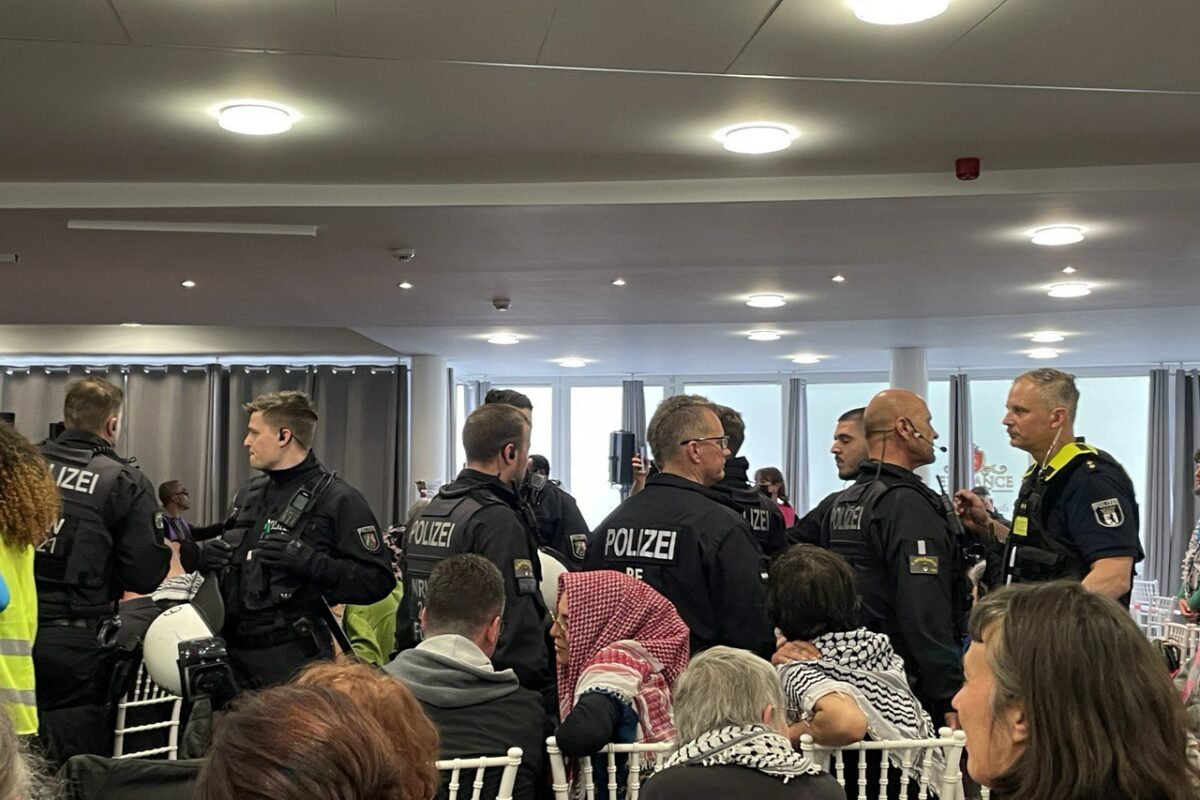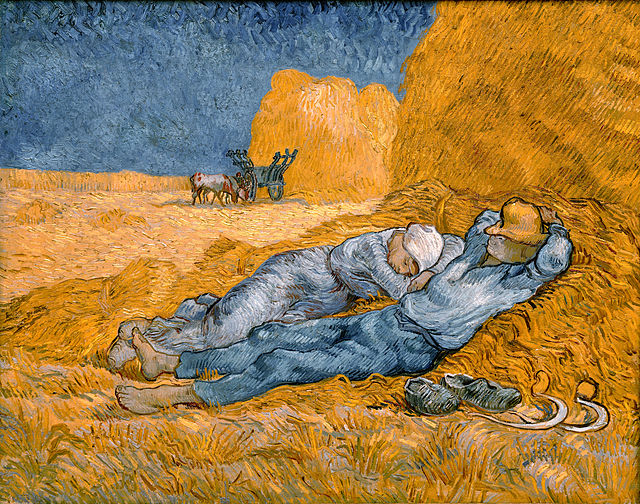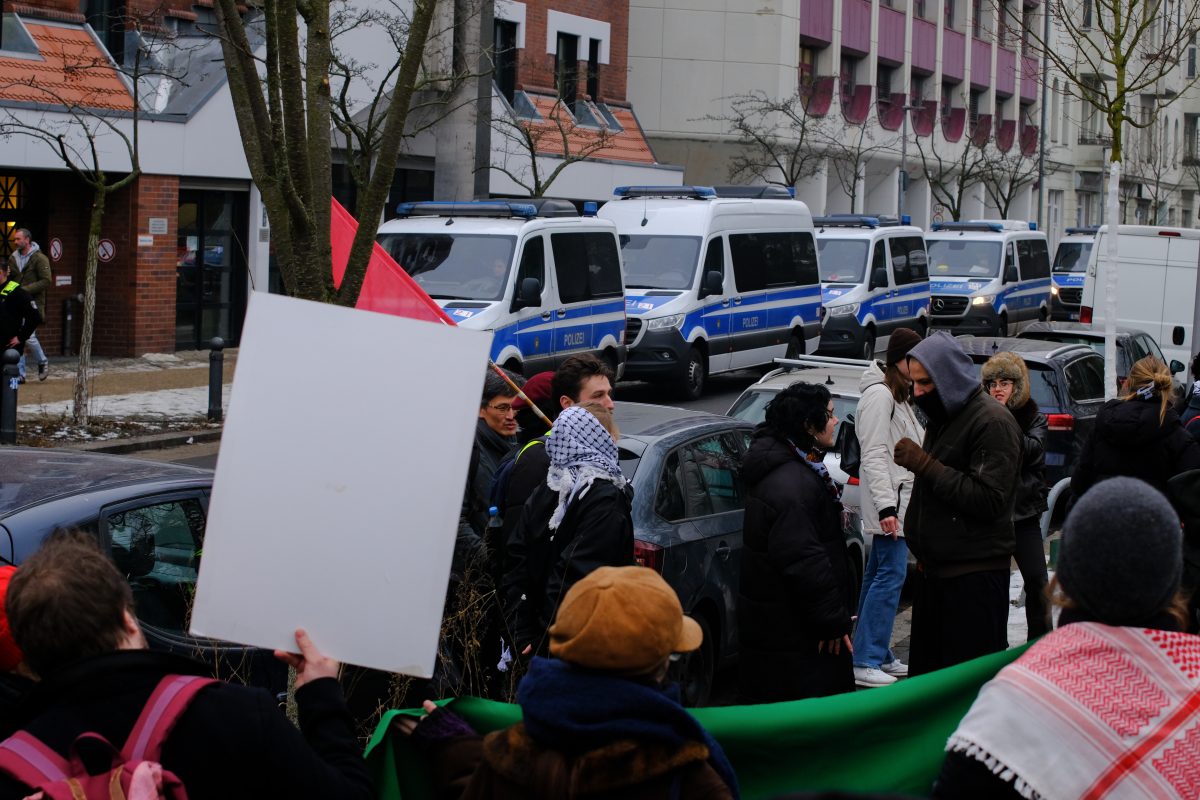To Mr. Jörg Reichel and Vereinte Dienstleistungsgewerkschaft:
Please accept this letter as my resignation from the Deutsche Journalistinnen- und Journalisten-Union/Vereinte Dienstleistungsgewerkschaft.
This resignation is both effective immediately and long overdue. I imagine it will also come as no surprise to Mr. Reichel, given that he lambasted me on Twitter last month for my London Review of Books piece, “In Berlin,” which detailed (among other things) my being refused press entry to the Palestine Congress on April 12.
Mr. Reichel’s reaction to my piece, including his accusation that I peddled “conspiracy theories,” comes as no surprise. He has made his position on Palestine, and seemingly that of the DJU’s, quite clear over the last six months. He has called lawful and legitimate protests outside Axel Springer and Tagesspiegel’s offices “anti-press” and an “alarming attack on press freedom.” He has accused private individuals who refuse to be filmed by news crews at pro-Palestinian demonstrations of “obstructing press work,” even when those press outlets are reporting with clear bias and bad faith. He has supported members of the press who attend demonstrations as “private citizens,” attempt to provoke protesters, and turn those interactions into news-worthy accusations of violence or hate speech. He has supported reporters who use racist rhetoric and gross mischaracterizations of pro-Palestinian demonstrations as pro-Hamas and antisemitic. He has at times made allegations of the latter himself, seemingly solely on the basis that these demonstrations criticize the Israeli government and with a willful disregard for the fact that many of these marches and rallies are co-led by Jewish organizations. (Before Mr. Reichel accuses me of antisemitism as well, allow me to get this out of the way: I am Jewish.)
Both implicitly (through Mr. Reichel’s rebranding of his personal Twitter account as that of the DJU’s Berlin-Brandenburg chapter) and explicitly (through statements made on behalf of the DJU), it would seem that these are stances held by my union — if not the ver.di community at large. As a member, I can say I was never consulted on this. It seems like poor journalism to me to describe a peaceful protest outside of a newspaper office as authoritarian or the work of people spewing “radical anti-Israel and antisemitic” rhetoric.
The DJU’s website describes journalism as “the most beautiful [profession] in the world,” one that the Union advocates for and supports. I question this advocacy and support for “the most beautiful profession” when Mr. Reichel and the DJU characterize my reporting on rhe Palestine Congress, reporting that included both personal eyewitness experience and interviews with over a dozen people on Friday alone, as “conspiracy theory.”
I question that advocacy and support for “the most beautiful profession” when Mr. Reichel and the DJU call on the police to “protect journalists” when protesters stage a registered demonstration outside of a newspaper office, but remain selectively silent when journalists are barred from doing their work, pepper-sprayed, and assaulted by that same police force.
I question that advocacy and support for “the most beautiful profession” when Mr. Reichel and the DJU support reporters for Tagesspiegel, Bild, and Ruhrbarone, but choose to dismiss the experiences of other reporters because they do not conform to a shared political viewpoint.
I question that advocacy and support for “the most beautiful profession” when neither Mr. Reichel nor the DJU have commented on the 142 journalists in Gaza who have, as of May 8, been reported killed, injured, arrested, or otherwise missing in conflict—a number that the Committee to Protect Journalists says is likely underreported given the circumstances.
The DJU’s website also calls journalism “essential for a functioning democracy.” You seem to have forgotten that opposition is also essential for a functioning democracy. The very role of a journalist is at times to be that opposition; to say “not quite,” to hear the other side of a story, or to find the voices not represented among the majority. If the DJU is not only unwilling to entertain that notion, but to also attack its own members who form an opposition, then it seems clear to me that this union does not stand for “the most beautiful profession,” but rather the basest of autocracies.
Yours sincerely,
Olivia Giovetti




